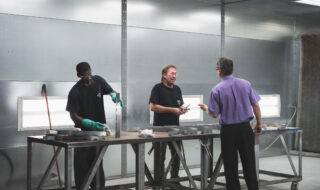March 15, 2022
Owners Who Report Inflation as Their Top Business Problem Hits 40-Year High
NFIB’s monthly Small Business Economic Trends (SBET) report found that in February the number of owners reporting inflation as their single most important business problem hit its highest level in over 40 years. Twenty-six percent of owners described inflation as their top business problem, a four-point increase since December.
In a 48-year record high reading, the net percent of owners raising average selling prices increased seven points to a net 68% (seasonally adjusted). Price hikes were the most frequent in retail businesses, followed by wholesale, construction, and manufacturing. A net 46% of owners also plan price hikes in the near future.
“Inflation continues to be a problem on Main Street, leading more owners to raise selling prices again in February,” said NFIB Chief Economist Bill Dunkelberg. “Supply chain disruptions and labor shortages also remain problems, leading to lower earnings and sales for many.”
The Bureau of Labor Statistics reported that the U.S. inflation rate rose by 7.9% in February, the fastest pace of acceleration in 40 years. In response, NFIB Vice President of Federal Government Relations Kevin Kuhlman encouraged elected officials “to enact policies that will promote economic growth and help, not hinder, the small business recovery.”
In February, the NFIB Optimism Index decreased by 1.4 points to 95.7, the second consecutive month below the 48-year average of 98 and the lowest reading since January 2021. Six of the ten indicators fell, while one increased and three remained unchanged. Small business owners expecting better business conditions over the next six months also fell, decreasing two points to a net negative 35%.
The hiring crisis that was one of the largest small business issues of 2021 continued in February. Forty-eight percent of owners reported job openings that could not be filled, an increase of one point from January. Ninety-three percent of owners hiring or trying to hire reported few or no qualified applicants for their open positions.
After a massive inventory build in Q4 of 2021, inventory accumulation plans continue to fall. Levels declined by one percentage point in February, following a five-point decline in January. However, owners reporting inventory increases remain historically strong at a net 5%.
Fifty-seven percent of owners reported capital outlays in the last six months, down one point from January. The most common source of spending was on new equipment (41%), followed by new vehicles (21%) and expanded facilities (14%). Another 27% plan capital outlays in the next few months, down two points from January.?
Thirty-seven percent of owners report that supply chain disruptions have had a significant impact on their business, a one-point increase from January. Another 33% report a moderate impact and 21% report a mild impact.
You can read the full monthly Small Business Economic Trends report here, and see a news release summarizing its findings here.??
At a time when small businesses face such serious economic obstacles, Congress has proposed adding higher taxes and new mandates that would impact small businesses. To let your Members of Congress know why your business can’t afford harmful tax increases or mandates, click here to customize and send your message.?
NFIB is a member-driven organization advocating on behalf of small and independent businesses nationwide.
Related Articles













